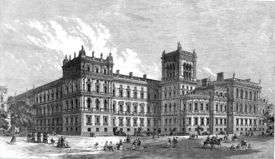Colonial Office

The Colonial Office was a government department of the Kingdom of Great Britain and later of the United Kingdom, first created to deal with the colonial affairs of British North America but needed also to oversee the increasing number of colonies of the British Empire.
It was headed by the Secretary of State for the Colonies, known as the Colonial Secretary.
First Colonial Office (1768–1782)
Prior to 1768, responsibility for the affairs of the British colonies was part of the duties of the Secretary of State for the Southern Department and a committee of the Privy Council known as the Board of Trade and Plantations.[1]
In 1768 the separate American or Colonial Department was established, in order to deal with colonial affairs in British North America. With the loss of the American colonies, however, the department was abolished in 1782. Responsibility for the remaining colonies was given to the Home Office, and subsequently (1801) transferred to the War Office.
Second Colonial Office (1854–1966)
In 1801 the War Office was renamed the War and Colonial Office under a new Secretary of State for War and the Colonies to reflect the increasing importance of the colonies. In 1825 a new post of Permanent Under-Secretary of State for the Colonies was created within this office. It was held by Robert William Hay initially. His successors were James Stephen, Herman Merivale, Frederic Rogers, Robert Herbert and Robert Henry Meade.[2]
In 1854 this office was divided into two and a new Colonial Office was created to deal specifically with the needs of the colonies and assigned to the Secretary of State for the Colonies. The Colonial Office did not have responsibility for all British possessions overseas. British possessions in India and certain other nearby areas were under the authority of the India Office, and certain informal protectorates and other areas (particularly Egypt) were under the authority of the Foreign Office. In 1907 the Dominion Division of the Colonial Office was created, and from 1925 separate Secretaries of State for Dominion Affairs were appointed. After the independence of India in 1947, the Dominion Office was merged with the India Office to form the Commonwealth Relations Office.
In 1966, the Commonwealth Relations Office re-merged with the Colonial Office, forming the Commonwealth Office. Two years later, this department was itself merged into the Foreign Office, establishing the modern Foreign and Commonwealth Office.
The Colonial Office List
From 1862, the Colonial Office published historical and statistical information concerning the United Kingdom's colonial dependencies in The Colonial Office List,[3] though between 1926 and 1940 it was known as The Dominions Office and Colonial Office List.[4] It later became known as the Commonwealth Relations Office Year Book and Commonwealth Office Year Book. In addition to the official List published by the Colonial Office, an edited version was also produced by Waterlow and Sons.[5] It can be difficult to distinguish between the two versions in library catalogue descriptions. For instance, The Sydney Stock and Station Journal of 3 December 1915 commented:[6]
This used to be the "Colonial Office Journal," but it looked – or sounded – too official, so they changed it to "The Colonial Journal." But it is still edited by Sir W. H. Mercer, K.C.M.G., one of the Crown Agents for the Colonies, but it is printed by Waterlow and Sons, London Wall. It comes as near to being an "Official publication" as possible, but we'll assume that it isn't.
Timeline
See also
References
- ↑ Colonial Office, The Canadian Encyclopedia
- ↑ Roy MacLeod (13 February 2003), Government and Expertise: Specialists, Administrators and Professionals, 1860–1919, Cambridge University Press, p. 168, ISBN 978-0-521-53450-5
- ↑ Great Britain. Colonial Office (1862–1925), The Colonial Office List for [year], London: Harrison and Sons; Great Britain. Colonial Office (1946–1966), The Colonial Office List, London: H.M.S.O.
- ↑ Great Britain. Office of Commonwealth Relations (1926–1940), The Dominions Office and Colonial Office List for [year], London: Waterlow & Sons, Ltd..
- ↑ See, for example, "Publications received: The Colonial Office List", The Queenslander, Brisbane, p. 3, 26 June 1915.
- ↑ "The Colonial Journal", The Sydney Stock and Station Journal, p. 4, 3 December 1915.